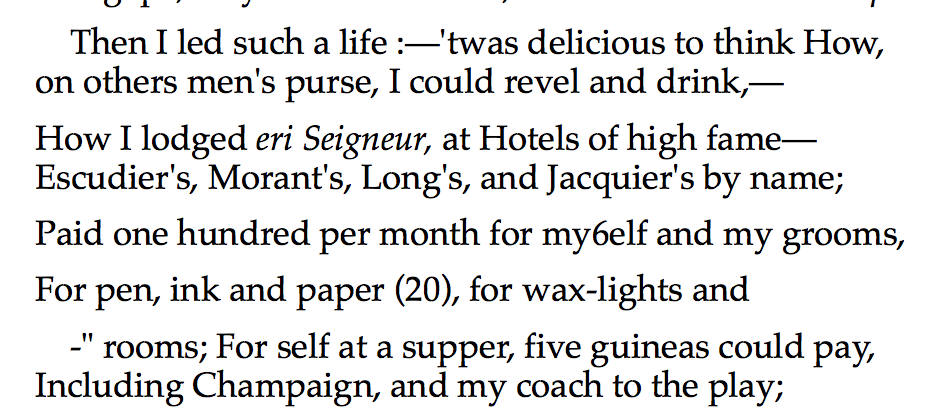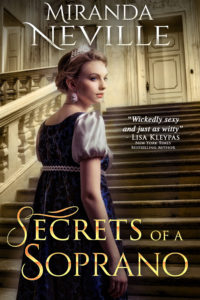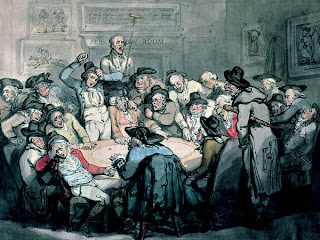Recently, I got to the point in the WIP (Surrender to Ruin, Sinclair Sisters Series, Book 3) where I really did have to research gaming hells since the hero of that book owns several and made an independent fortune in the trade.
I began with the first question that popped into my head. Were these establishments actually called “Hells”? There are a lot of phrases ascribed to the Regency era that are commonly accepted today as true without documentation. Fortunately, a Google Books Advanced search can now answer some of this pretty quickly. And so it was with gaming hells.
Yes, I could have started with the dictionary, but I wanted my searching to do double duty– confirm the use and give me the sources that used it.
By the way, the OED has several documented uses for Hell, as in a Gambling Hell. The OED dates Gambling Hell as early as 1818, but the entry for Hell (a gaming house) has an earlier citation of 1812, and a less definitive one for 1793. So, the ladies and lads at the OED are inconsistent here.
The John Hunt publication of Canto XI of Byron’s Don Juan (1823 for Canto XI) has this note to Canto XI xxix. 117. I’m afraid the OED implies the below language is from the actual poem which it’s not. It’s from the notes. Nevertheless, the phrase is in the original published volume.
Note 2, page 117, stanza xxix
St. James’s Palace, and St. James’s “Hells.”
“Hells,” gaming-houses. What their number may now be in this life, I know not. Before I was of age I knew them pretty accurately, both “gold” and “silver.” I was once nearly called out by an acquaintance because, when he asked me where I thought that his soul would be found hereafter, I answered, “In Silver Hell.”
Oh, that Lord Byron. Anyway, since I wanted more than the definition and usage, I went to Google Books.
Answer: Yes. At the very minimum, it was in the vernacular. No surprise there, to be honest. I went in fairly confident of that.
I hit pay dirt pretty quickly, and I ended up with a lot of great sources, but there was one that really stood out, The Greeks, a treatise on gambling in the form of a heavily footnoted poem. This was pretty common in the period. See, for example, Scribbleomania, (I mention this source and link to it in that post.) Like The Greeks, that work is a satirical poem about the publishing business, with fascinating footnotes. Its author was William Henry Ireland, noted forger.
I’ll talk about The Greeks in this post because it was awfully fun to read.
First, Gaming Hells were often run by partners, at least one of whom was a banker: someone with access to cash, for obvious reasons. Some of these proprietors were men who were, indeed, once waiters or fishmongers, but some would have to be considered gentlemen. The Greeks contains, among other things, a list of names and addresses of several hells and includes their partner-owners. I found several cross-references to those names, particularly Oldfield. Not that anyone should take this as confirmed, since publishing of the period is incestuous. One finds the same text in multiple sources. There was a lot of “borrowing” and lack of attribution.
Nevertheless, here are some names and addresses of London Hells:

Naming Names Dude
In case the image doesn’t come through or you just need the text, here it is:
Fashionable houses, or Hells.
Two Sevens, 77 St. Jame’s Street. T.C.C.T. and Co.
Hazard Table, opposite.
Bennett St., St. James’s, Fielder, Miller, and Carlos.
1o, St. James’s Square. Abbott, Watson, Davies, Fearlove, Leach, and Holdsworth
6 King St., St. James’s. Leach
10, ditto, ditto. Davis the Elder
40, Pall-Mall. Taylor, Phillips, and Lowe
Sunday houses.
77 Jermyn Street. Geo. Smith, Pope, and Co.
27, Bury Street Oldfield, Bennett, and Co.
General Hints. Major Berger, Phillips, Colonel. Tucker, C. Greenwood, Esq. &c
“Sunday Houses” as you might imagine, refers to Hells that were open on Sundays. So, tuck that way.
I will say that the concentration of Hells in St. James’s makes sense — go where the money is, but it also is meticulously documented by academic researchers. While reading another source, I came across mention of volume titled The Greeks that, this author said, talked scandalously about Gaming Hells.
Scandalous? Honey, I’m there.
In this sense, Greeks means gamblers, by the way.
My initial search for a book with that title was disappointing, but then I found an entry with an unreadable title because the first line of the frontispiece is the title in Greek and was “transcribed” from Greek.
The Greeks.
Researchers and cynics alike will enjoy this book. There’s something for everyone here. It’s a poem, which is sometimes pretty clever, and there’s loads and loads of footnotes, which is where most of the information is. Of course the anonymous author has an agenda and a world view that constitute his truth. Yet, in the whole, there is a useful framework. We can intuit the issues of the day from the way and the words the author presents to us. In this case, for example, a deep, deep sense of class separation.
This book contains a lengthy footnote (see below, “The Barrymore Footnote”) about the scandalous Earl of Barrymore and one of his sons who had a club foot. I’ve included the footnote below. The text also contains a list of names of gamblers with hyphens meant to disguise the actual name. Nearly 200 years later and it’s easy to fill in most of the blanks…
Here’s a portion that’s meant to show that it’s just better to be rich. The gentleman who is the subject of this paragraph was a noblemen said to rarely be at home because he lived mostly at a hotel that over-charged him for everything. And his Lordship did not seem to care or even be aware.

Over Charging?
Then I led such a life: —’twas just think How,
on others [sic] men’s purse, I could revel and drink, —
How I lodged eri Seigneur, at Hotels of high fame —
Escudier’s, Morant’s Long’s, and Jacquier’s by name;
Paid one hundred per month for myself and my grooms,
For pen, ink and paper (20), for wax-lights and
rooms; for self at a supper, five guineas could pay,
Including Champaign [sic], and my coach to the play;
There was also a reference to maggot racing. Yes, including how to cheat at maggot racing. Again, true? Maybe, maybe not. You encourage your maggot to win by heating the plate. To hamper the competition, one “accidentally” drops a flake of snuff in the way, tobacco being an insecticide, but potentially an obstacle as well. This led to a hilarious exchange on twitter.
NB: My next historical will be Miss Harper’s Night of Passion, in which Miss Fiona Harper’s brother accidentally kills his racing maggot by overheating his plate and loses his sister to the rakish Lord Hawke.
I consider The Greek to be a flavorful addition to my research. In other words, likely overstated but giving a very good flavor of the environment.
According to The Greeks, the legal position of gambling (illegal) in which one could inform the authorities about gamblers led to frequent blackmail. Hush money (Exact phrase used, by the way) was paid. As with prizefighting, also illegal, the authorities were bribed to look the other way.
In other research, I came across a publication that included this (purported?) letter to The Times. It references several of the owners of the Hells listed above.
To the Editor of The Times.
Sir, – the invulnerability of “Fishmonger’s Hall,’ or the Crock-odile Mart for gudgeons, flat-fish, and pigeons, is likely soon to be put to the proof. The principal mover and actor in this ‘Hell’ is now under indictment charged with having had a share in the lowly one of King St., St. James’s; and unless, like the rest, it is compromised (which, for the sake of humanity, let us hope will not be the case), the trial will come on in a few days. An action is also pending against the same party, wherein the penalties sought to be recovered from monies gained by illegal gaming at the ‘Hell’ are stated to be (L) 160,000.
This ‘Hell’ has recently commenced the infernal trade again, after a short vacation of about two months, during which time the procurers to it, who are broken men of fashionable notoriety, have been very active. Melton Mowbray, Brighton, Cheltenham, and other places of high and wealthy resort, have been visited in their turns, and it is pompously announced that no less a number than two hundred names of young nobility and gentry are down upon the blacklist is admissible to this ‘Hell’ — I beg pardon — to this ‘Club ! ! !’ as it is called.
‘Tremble, ye parents, lest your fond hopes in those who will be the representatives of your honours and estates be blasted forever in this gigantic house of ruin, and that all devolve deluded, infatuated visitors to it. It will — it must, prove the grave of many a fortune, mind, and honour, like other ‘Hells’ have been, over which the very same parties who keep this have heretofore presided. It would be shocking to see your ancient patrimony’s, handed down to you by your forefathers, melt away like snow before the sun, to enrich a ci-devant fishmonger, and an ex-waiter of a faro ‘Hell.’ Their fortunes are already immense, created by the same means, but composed of those lost by many, some of whom have met with violent deaths, and others are now struggling with wretchedness and despair.
“I am, Sir, your humble Servant,
London July 22, 1824 EXPOSITOR.
The Barrymore Footnote
Lord E. b.
This is a well preserved and perfect model of the Greek school — and uncopied original, and of course very valuable. We much wonder, therefore, that in the late exhibition we had not the pleasure of contemplating his jolly face either in a solo, or with his young companion by his side like Gaite I’innocence.
[no idea some word] he may be said to have followed his noble and distinguished progenitor with unequal step —“Sequiturqtie Patrem hand passibus equis.” But however unequal his steps have been in one way, he has no equal as to some of the steps which he has taken as a passenger through life. Like many of the fanciful productions of ancient Greece, his statue is certainly whimsical, and a very portly figure ends in a very strange way; this haaseibn [sic] foot many a joke detrimental to the peer: but then, luckily, he has broad shoulders, and he can bare it all: — plenty oj’ [sic] face; and he cannot be put out of countenance. Some ill naturedly cry, if they see him at a horse race or a cock pit, a milling match or a bull bait, a badger hunt or, in short at any of the elegant places of resort for the fancy, “There goes old club footed “Mulciber booted;” others inurbanely call him the president of the Greek Club: some, who doubtless have suffered in some way by his Lordship, stupidly quote Ovid, and call him, very improperly, * damnatus et exlex, passing thus a sort of grammatical outlawry on him; others making him owe of the legs; others a leg amongst legs, and other still a leg of all legs — Gambado Gambadorum.
Nevertheless, the Jockey Club and all sporting men from the Prince down to the ostler and bottle holder, allow the few in his walk of life can beat him; and so says mother Wood,— who, be it well understood, is neither a wooden leg, nor even a broken leg, nor one of our fashionable emigrants who has taken leg, nor a certain class who have given leg bail, but a very respectable well-known housekeeper, very greatly connected.
* Vide the Speeches of Ajax and Ulysses.
To be sure, it has been asserted that some mock modest females have flown from this comely Lord, whenever they diskivered his cloven foot; but this is pure scandal; for it is well-known that “my Lord” is a woman’s friend: ergo — this charge falls to the ground. And as to the bandying about his “style being worse than his gate” and the story of Billingsgate and Hellgate and Newgate and Cripplegate, and such like stale jokes, it has not affected the good footing which he will always be on with men of taste and bons titans. No man has better spirits, or wine, better humour than his Lordship.
As a child’s guide, he is rather unfortunate; and the little ruffian who formerly was a miniature fidus Achates has now deserted him, and is not allowed to go near him for fear of his morals being spoiled! His patron has, however, chosen another protégé for his gigish companion; and it is to be hoped, that he will be more faithful and mindful of past kindness than the last. This is an odd taste of the peer’s! But it looks so innocent to see puerility by his side; and then it takes less room in a tilbury, and is more becoming the body corporate of the peerage, than to be squeezed by a varlet of a groom; and then again little people can do little messages, and a lady can pat a child upon the head and return an answer so cleverly that upon the whole we do not blame my Lord for his selection of a companion.
To conclude — we hope that no envious remarks may have any weight with the noble Lord in question, but that he may have long life and long credit, and may, to the end of the scene, stick to the old maxim:
“Dum vivimus, vivamus”
Mr. N-b.
I’m now beyond Dame Fortune’s power:
the man that’s down can fall no lower
HUDIBRAS.
We were just about to give an account of this defeated Greek, when we learned that he had for a long time been lingering in poverty — in an hospital or a workhouse! the two preceding lines from Hudibras will therefore suffice for his history. This is an awful lesson for those who have not made hay whilst the sun shone — the rest we pass over in silence.
 Great fame brings great heartbreak
Great fame brings great heartbreak He’s an artist and a duke’s heir. She’s sheltered and scarred. Can he show her by Christmas that love can be theirs to share?
He’s an artist and a duke’s heir. She’s sheltered and scarred. Can he show her by Christmas that love can be theirs to share?



